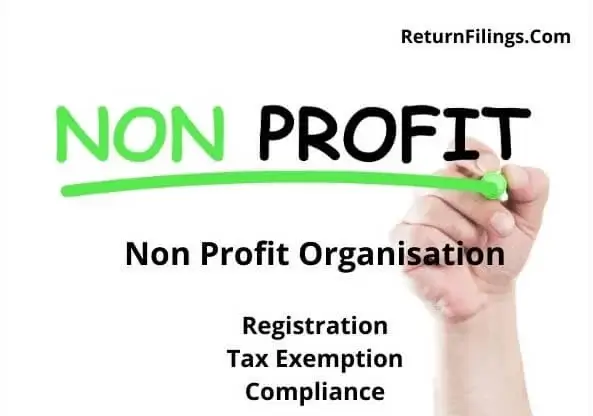Non-Profit Organisation (NPO) Registration India: Legal Types, Process & Tax Exemptions
1. Introduction to Non-Profit Organizations
Non-Profit Organizations (NPOs) are entities established to provide goods or services without the intent of making a profit. No member is entitled to any profit, and all earnings are reinvested to further the organization’s objectives.
2. Legal Structure of NPOs in India
In India can be registered under different legal structures, including:
• Trusts
• Societies
• Section 8 Companies
Among these, Section 8 Company registration is the most preferred due to its structured corporate framework, ease of operation, and credibility among donors and government bodies.
3. Sources of Funding for NPOs
Since they do not operate for profit, their main sources of funding include:
• Donations from individual donors
• Grants from other foundations
• Sponsorship from corporations
• Government funding
• Revenue from service or merchandise sales
• Income from investments
• Funds collected for redistribution to other charities
4. Types of NPO Registrations in India
4.1 Trust Registration
A Trust is formed by a trustor (settlor) who transfers assets to a trustee for the benefit of a beneficiary. It is widely used for charitable purposes. Trust registration requirements include:
• Minimum of two trustees
• No specific law governing trusts, except in states like Maharashtra and Tamil Nadu, which have their own Public Trust Acts.
4.2 Society Registration
Societies are registered under the Societies Registration Act, 1860, and require a minimum of seven members. They aim to promote:
• Science, arts, literature
• Social welfare
• Public museums, libraries, and military orphan funds
4.3 Section 8 Company Registration
A Section 8 Company is registered under the Companies Act, 2013. It is similar to a trust or society but follows a corporate structure. Key points include:
• No profit distribution among members
• Higher credibility and recognition from government bodies
• Tax exemptions for both the organization and donors
5. Benefits of Section 8 Company Registration
• Enjoys several tax exemptions (e.g., 12A and 80G certificates)
• No minimum capital requirement
• Limited liability for members
• Increased credibility among stakeholders
• Can legally enter into contracts and own property
6. Step-by-Step Process for Registering an NPO in India
6.1 Choosing a Suitable Structure
• Minimum two directors for a private limited Section 8 company
• Minimum three directors for a public limited Section 8 company
• At least one director must be a resident of India
• Maximum 200 members for private limited companies (no limit for public companies)
6.2 Obtain Digital Signature Certificate (DSC)
• Required for online filings
• Issued by government-approved certifying agencies
6.3 Obtain Director Identification Number (DIN)
• Apply via Form DIR-3 on the MCA Portal
• Requires self-attested PAN, identity, and address proof
6.4 Reserve Company Name
• Apply through the MCA Portal for name reservation
6.5 Register the Company
• File Form INC-12 to obtain a Section 8 company license
• Submit SPICe+ form for incorporation
• Attach Memorandum of Association (MOA) and Articles of Association (AOA)
6.6 Obtain PAN and TAN
• Required for financial transactions and tax compliance
6.7 Compliance Requirements
• Minimum two board meetings per year
• Maintenance of books of accounts and financial statements
• Mandatory audit reports and income tax filing
7. Tax Exemptions for NPOs
7.1 SECTION 12A Registration
• Exempts the NPO from income tax
• Must meet specific compliance conditions
7.2 80G Certificate
• Allows donors to claim tax deductions
• Enhances credibility and fundraising potential
8. Post-Registration Compliance and Regulatory Requirements
Even after incorporation, NPOs must comply with various regulations, including:
• Annual filings with the Registrar of Companies (ROC)
• FCRA registration for receiving foreign donations
• GST registration if applicable
• Other regulatory requirements based on operations (e.g., import/export code)
9. Conclusion
Setting up an NPO in India requires careful planning and compliance with multiple regulations. ReturnFilings.com provides end-to-end support for NPO registration, compliance management, and legal advisory services to ensure smooth operations.
With expert assistance from Return Filings, you can ensure a smooth registration and compliance process for your Non-Profit organisation (NPO). For professional assistance, reach out to us on email: info@returnfilings.com or on whatsapp: https://wa.me/919910123091.
frequently asked questions (faq's) related to Non-Profit Organization (NPO) Registration in India
Q What is a Non-Profit Organization (NPO)?+
A A Non-Profit Organization (NPO) in India is an organization established with a primary objective other than making a profit. These organizations work for charitable, social, educational, religious, or other altruistic purposes. Profits, if any, are reinvested into the organization to further its mission.
Q What are the common legal structures for NPOs in India?+
A The most common structures are:
• Trust: Governed by trust law, created by a trust deed.
• Society: Registered under the Societies Registration Act, focuses on specific objectives.
• Section 8 Company: A company registered under Section 8 of the Companies Act, 2013, for charitable or not-for-profit purposes.
Q What are the key characteristics of an NPO in India?+
A Key features include:
• Non-profit motive.
• Reinvestment of profits.
• Focus on charitable or social causes.
• Distinct legal identity (for companies and some trusts).
Q What are the advantages of registering an NPO in India?+
A Advantages include:
• Legal recognition and credibility.
• Access to funding and grants.
• Tax benefits (subject to meeting specific criteria).
• Exemption from certain regulations.
Q How can an NPO be registered in India?+
A The registration process varies depending on the chosen legal structure:
• Trust: The process involves drafting a trust deed, registering it with the sub-registrar, and obtaining a PAN card.
• Society: Registration is done with the Registrar of Societies in the respective state. It involves submitting an application with the required documents.
• Section 8 Company: Registration is done through the MCA portal (SPICe+ form). It involves obtaining a DSC and DIN, reserving a name, drafting the MoA and AoA, and filing the forms with the RoC.
Q What are the documents required for NPO registration in India?+
A The required documents vary depending on the structure:
• Trust: Trust deed, identity proof of trustees, property documents (if applicable).
• Society: Application form, MoA and AoA, list of members, identity proof of governing body members.
• Section 8 Company: Application form (SPICe+), MoA and AoA, identity and address proof of directors, PAN card of directors, DSC, NOC for registered office address.
Q Is it necessary to have a registered office for an NPO in India?+
A Yes, a registered office is mandatory for all NPOs, irrespective of structure.
Q How long does it take to register an NPO in India?+
A The registration process can take several weeks or even months, depending on the chosen structure and the processing time of the registering authority.
Q Can foreign nationals be involved in an NPO in India?+
A Yes, foreign nationals can be involved, but they must comply with relevant regulations, including those related to foreign contributions (FCRA).
Q How are funds raised by an NPO in India?+
A NPOs can raise funds through:
• Donations.
• Grants (government and private).
• Membership fees (for some structures).
• Income from activities related to their objectives.
Q What are the compliance requirements for an NPO in India?+
A Compliance requirements vary, but generally include:
• Maintaining proper books of accounts.
• Conducting annual audits.
• Filing annual returns.
• Complying with tax regulations.
• Adhering to specific regulations based on the structure and activities (e.g., FCRA for receiving foreign donations).
Q What are the tax benefits available to NPOs in India?+
A NPOs can avail tax exemptions under Sections 80G, 11, and 12A of the Income Tax Act, subject to meeting specific criteria and obtaining necessary certifications.
Q What is the Foreign Contribution (Regulation) Act (FCRA)?+
A The FCRA regulates the receipt and utilization of foreign contributions by NPOs in India. Registration under FCRA is mandatory for NPOs receiving foreign funds.
Q How do I register a non-profit organization in India?+
A Covered in the registration process details.
Q What is the difference between a trust, society, and Section 8 company?+
A Discussed in the legal structures section.
Q How do I get 80G exemption for my NPO?+
A Application shall be made to the Commissioner of Income Tax.
Q How do I register my NPO under FCRA?+
A Application shall be made online through the FCRA portal.
Q What are the legal requirements for running an NPO in India?+
A Covered in the compliance section.
Q How do I manage the finances of an NPO?+
A Maintain accurate records, conduct regular audits, ensure transparency.
Q How do I dissolve an NPO?+
A The process varies based on the structure and is governed by applicable laws.
Q Can an NPO own property?+
A Yes, NPOs can own property in their name.
Q How do I choose a name for my NPO?+
A The name should not be similar to existing organizations and should reflect the NPO's objectives.
- For further reading, explore the following topics:
- 🏛️ Section 8 Company Registration in India: Legal Process, Requirements & NGO Advantages
- 🤝 How to Register an NGO in India: Types, Eligibility Requirements & Compliance Checklist
- 📜 Section 12A & 80G Registration for NGOs in India: Complete Process & Compliance Requirements
- 🔍 Step-by-Step Guide to FCRA Registration in India: Eligibility, Process & Annual Compliance

